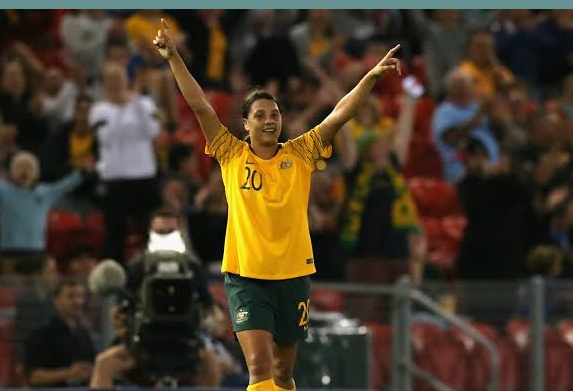Canberra: Four years after an early exit on penalties, Australia’s national women’s football team heads into the FIFA World Cup seeking to make amends – and history.
When the Matildas kick off their home World Cup campaign against the Republic of Ireland in Sydney on Thursday night, it will mark the beginning of the most important tournament in the history of Australian football, reports Xinhua.
More than 80,000 people are expected to be in attendance – a new record for a Matildas match – with millions more watching on television around the country.
The increased support, however, comes with increased expectations that the Matildas will make a deep run at the tournament.
Neither Australia’s men’s nor their women’s teams have ever made it past the quarterfinals at a World Cup – an achievement that will be considered the minimum mark of success this time around.
In 2019, the best-ever Matildas team to that point was knocked out of the World Cup in the round of 16 on penalties, prompting the hiring of Tony Gustavsson, a two-time World Cup winner as an assistant coach for the US, as head coach with a major focus on 2023.
After a rocky start to his tenure, Gustavsson’s side goes into the tournament ranked 10th in the world with victories over fellow contenders France, Sweden, England, Spain and Denmark in the last 12 months.
For the Matildas, to make history with a semifinal berth they must first navigate a group dubbed by many experts as the “Group of Death.”
Following the opening match against Ireland, the Matildas will play Nigeria on July 27 in Brisbane and reigning Olympic champions Canada in Melbourne on July 31.
If they finish second in group B, the Australians could face England, UEFA Women’s Euro 2022 winners.
No Australian player will be under the World Cup spotlight more than captain Sam Kerr.
The leading goal scorer in Matildas’ history, Kerr is among the best women’s footballers in the world, having led English giants Chelsea to four consecutive league titles.
Despite carrying the weight of the nation on her shoulders, Kerr has not shied away from the pressure of the career-defining tournament.
“If the pressure’s not there, it probably means it’s not that big of a game to be honest. Pressure is a privilege and I love pressure,” she told the Australian Associated Press (AAP).
“I love being in a moment where one or two moments can change the path of your career really, and I think this World Cup is one of those moments.”
Having previously been deployed on the wing for the national team, the emergence of 21-year-old Kyra Cooney-Cross and 20-year-old Mary Fowler as wide players has allowed Kerr to primarily play through the middle for the Matildas where she forms a formidable partnership with Caitlin Foord.
If Kerr and Foord are going to thrive, it must be built on the foundation of a rock solid defense.
Increasing the defensive depth available was identified as a major priority for Gustavsson after the Australians were exposed in the area in 2019.
The Matildas failed to keep a clean sheet in any of their four matches at the previous World Cup, with injuries exposing their over-reliance on veterans Clare Polkinghorne and Alanna Kennedy at center back.
Both are again part of the squad despite an injury-plagued season for the latter with Manchester City, but they have been revitalized by the introduction of Clare Hunt.
The 24-year-old made her Matildas debut in February and has made herself one of the first names on Gustavsson’s team sheet.
In Hunt’s six appearances for the national team, the Matildas have lost only once and conceded three goals.
On either side of the central defenders, full backs Steph Catley and Ellie Carpenter – both among the best players at their position in the world – will be tasked with generating much of the Matildas’ attacking drive, with central midfielder Katrina Gorry ensuring they do not leave Australia exposed at the back.
–IANS


Comments are closed.